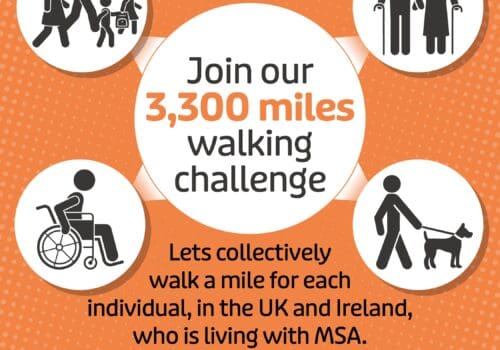MSA Trials Update
We are pleased to share a blog from our Scientific Advisory Panel Chair and Trustee, Dr Christopher Kobylecki on the current state of clinical trials in the UK for MSA therapies.
I recently attended the International Parkinson’s Disease and Movement Disorder Society annual meeting in Madrid. It was inspiring to hear updates on progress on trials in Multiple System Atrophy presented at one of the main sessions.
The increasing numbers of trials of potential treatments for symptom control and disease modification in MSA is an exciting development for people living with this condition. Several examples of recent trials were discussed which sadly did not show effectiveness for slowing down the progression of MSA. These include the M-STAR trial of the anti-inflammatory drug verdiperstat, and the trial of sirolimus. While it is disappointing to see these negative results, the information obtained from these trials will help our overall understanding of the causes and progression of MSA, and they show that it is possible to run large trials of new treatments on this condition.
Several trials currently recruiting in the UK were mentioned and I present an update on these:
ATH434: the development of alpha-synuclein MSA pathology has been linked to abnormal deposits of iron, which can be shown on brain scans of people with MSA. The drug ATH434 has been shown to improve measures of brain injury in animal models of MSA and is now being trialled in a phase 2 trial in people with early MSA (less than 4 years of symptoms). This is a placebo-controlled trial which will examine the effects of ATH434 on brain iron deposition and clinical measures. The trial is being run at several UK specialist MSA centres, including Salford, Newcastle and London.
STAG-MSA: this study, run at Oxford, examines the effect of deep brain stimulation surgery (DBS) on low blood pressure and walking problems in MSA. We know that DBS has limited effects on limb movement in MSA, but the study team wish to see if it could have a beneficial impact on other problematic symptoms such as blood pressure and gait control.
We await with interest the results of the MSA Exenatide trial which has completed recruitment and is continuing to follow up participants at UCL, London.
For people with MSA wishing to hear more about these studies, your MSA Trust Nurse Specialist could help point you towards centres close to you who are involved in this research.
Dr Christopher Kobylecki
Disclaimer: The views and opinions expressed in the blogs published on these pages are those of the authors and do not necessarily reflect the official policy or position of the MSA Trust.
Recent Posts

MSA Candlelight 2025
19 Jun 2025 | 2 comments

International Nurses Day 2025
12 May 2025 | 1 comment


I would like to hear more on these trials on BP, as I am a patient at NYU Disautonomia center. Recently diagnosed
I was diagnosed (after seeing many doctors for a year or more) by a neurologist a year ago and it seems to be digressing fast, as I can hardly walk or talk already… help!
Please notify me of any upcoming MSA trails.
I have probable MSA-C
I’m interested in the results
Diagnosed about 2 years ago
Has the new drug ATH434 been successful?? My husband has been diagnosed with MSA- type C
Hello the trial has closed to new recruits and we are waiting for results to be analysed and published. There is currently no date for that yet.
The trial is complete in Nov and results will be reported in Jan. They have a small open label trial underway which just reported some interim results at 6 months and is looking good. There were stable disease and improvers. All improvers and stable disease were early stage, in this trial with both early and late stage in this open label trial. The trial was tiny, but could be a good indicator of what is ahead in the double blind trial finishing in November. The double blind is all early stage.
Where can we find the results when they are available?
I posted a webinar from the doc who is doing that trial giving up to date info, but I guess it has been removed. Sorry
My wife diagnosed with MSA-C June 2023
Hello
If you have questions please contact us at support@msatrust.org.uk
My husband has been suffering with MSA for the last 3 and a half years and really wants to fight and go on any trials availablem
Who di I contact at the Newcastle upo Tyne location